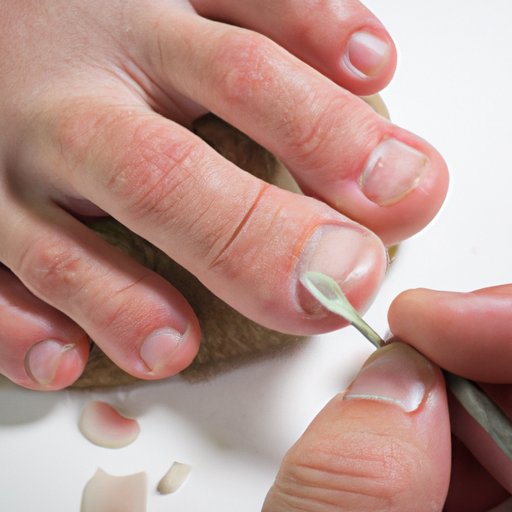Introduction
Nail fungus is a common condition that affects the nails of the hands and feet. It is caused by fungi that can live on the dead tissue cells found in the outer layer of the skin. The condition is known as onychomycosis, tinea unguium, or dermatophytic onychomycosis. It is estimated that 1-12% of the population has nail fungus.
Treatments for nail fungus range from over-the-counter medications to home remedies and professional treatments. Each method has its own benefits and drawbacks, so it is important to understand how to treat nail fungus before attempting any treatment.
Symptoms of Nail Fungus
The symptoms of nail fungus can vary depending on the type of infection and the severity of the infection. Common symptoms include discolored nails, thickening of the nails, brittle nails, white spots on the nails, and an unpleasant odor coming from the infected nails. If left untreated, the infection can spread to other areas of the body, such as the scalp and skin.
Medications for Nail Fungus
If you have been diagnosed with nail fungus, your doctor may prescribe oral or topical antifungal medications. Oral antifungals are taken by mouth and work to kill the fungus from the inside out. Topical antifungals are applied directly to the infected nails and work to stop the growth of the fungus.
Oral antifungal medications can cause side effects such as nausea, headaches, and abdominal pain. There is also a risk of liver damage, so regular blood tests are necessary while taking oral antifungal medications. Topical antifungals can cause skin irritation, so it is important to follow your doctor’s instructions carefully.
Home Remedies for Treating Nail Fungus
In addition to medications, there are several home remedies for treating nail fungus. These include soaking the affected nails in vinegar, applying tea tree oil, using baking soda and water paste, and applying Vicks VapoRub. All of these home remedies work to kill the fungus and help to reduce the symptoms of nail fungus.
When using home remedies, it is important to be aware of the risks associated with using them. Some ingredients can cause skin irritation, so it is important to patch test any product before using it. It is also important to keep the infected area clean and dry to prevent the spread of the infection.

When to Seek Professional Treatment
If home remedies and medications are not effective, it is important to seek professional treatment for nail fungus. A doctor can prescribe stronger antifungal medications or recommend laser treatment. Laser treatment involves using a beam of light to heat up the infected nails and kill the fungus. This procedure is generally safe and effective, but it can be expensive.

Risks Associated with Ignoring Nail Fungus
If left untreated, nail fungus can spread to other parts of the body. It can also lead to more serious health issues, such as bacterial infections and permanent damage to the nails. It is important to treat nail fungus as soon as possible to prevent further complications.
Conclusion
Nail fungus is a common condition that can cause discoloration, thickening, and brittleness of the nails. Treatment options for nail fungus include medications, home remedies, and professional treatments. It is important to understand the risks associated with ignoring nail fungus and to seek professional treatment if home remedies and medications are not effective.


